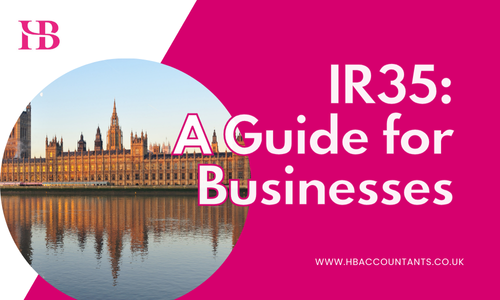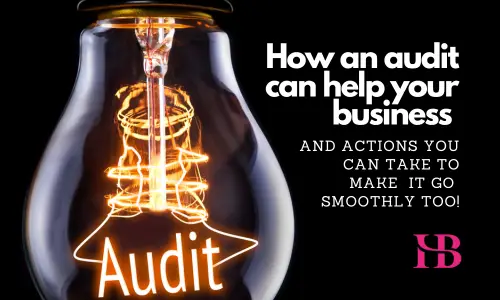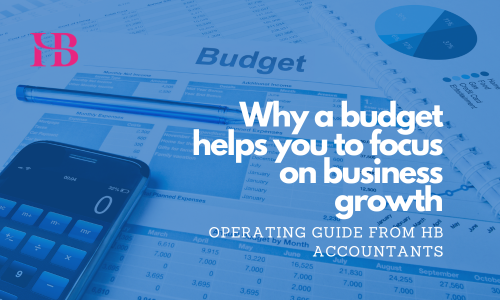The IR35 off-payroll working rules have seen significant changes in recent years. Historically, this has impacted public companies but since 2021, this is also an issue for all businesses. This is a brief overview of the current IR35 situation and how it may impact your business if you employ contractors.

What is IR35?
IR35 was introduced to combat tax avoidance through ‘disguised employment’. It ensures that contractors working like employees pay similar tax and National Insurance contributions.
The rules apply if the worker provides services to your business through their own intermediary, such as a limited company, agency, or as a sole trader, would have been considered an employee if they were providing their services directly.
IR35 was introduced as there were many situations when a traditional ‘employee’ left their job one day, only to return to work in the same or a similar role shortly afterwards, but via a limited company structure. This meant that they enjoyed all the tax benefits of being a limited company but still worked in a similar manner to regular employees.
Who determines whether a role is inside or outside IR35?
IR35 has been in place for the public sector since 2017 and this was expanded to include private businesses from April 2021. At this point, the responsibility for determining IR35 status shifted from contractor to client, as long as the client is a large or medium-sized private business or a public sector client.
Small private sector clients are exempt and contractors remain responsible for determining whether IR35 applies. A small company is one with an annual turnover not more than £10.2 million, a balance sheet total not more than £5.1 million, and has no more than 50 employees.
The off-payroll working rules apply on a contract-by-contract basis and a worker may have some contracts which are within the off-payroll working rules and some which are not. A contract includes a written, verbal, or implied agreement between parties.
A contractor can find more information if you are a contractor working for a small business or working for mid or large-sized businesses on the gov.uk website.
What happens if a role is inside IR35?
A worker’s employment status determines the taxes the worker and the employer need to pay, depending on whether a worker is determined as employed or self-employed.
If a client is responsible for determining the worker’s employment status for tax, they should produce a status determination statement (SDS) including the reasons for their determination.
A contractor can challenge the status determination and the client has 45 days to respond to the challenge.
If the worker is deemed to be employed for tax purposes, the employer must deduct Income Tax and employee National Insurance contributions from fees paid to the worker’s intermediary. Employer National Insurance contributions and Apprenticeship Levy, if applicable, must also be paid to HMRC by the employer.
If a contractor is outside of IR35, the contractor’s limited company receives gross payment and manages its own tax affairs.
Bear in mind that HMRC can investigate current and past engagements and there is the potential for significant tax bills, interest, and penalties for non-compliance so it’s important to keep records about decisions and contracts.
Is a role inside or outside of IR35? An overview
HMRCs online tool, CEST (Check Employment Status for Tax) will help determine the employment status of a contractor. It’s not mandatory to use CEST but it can provide a level of assurance if used correctly. Here are the key IR35 factors used in determining whether or not an assignment would be deemed to be IR35 caught or not.
1. Control and Direction
Does the client or contractor control where, when, and how the individual performs their work? For example, can a contractor demonstrate autonomy in the way they undertake a professional services project?
Employees are typically under the direct supervision and control of a line manager, however the self-employed determine how they complete the work they have been hired to do. Specifying milestones or tasks to achieve, rather than being an open-ended pile of work, can mean the difference between whether the project is inside or outside of IR35.
The role may be perceived by HMRC as Inside IR35 if the contractor is:
- Supervision by a line manager or similar company employee.
- Has specified work start and end times
- Has staff ‘perks’ such as holiday or sickness pay
2. The Right of Substitution
The right to provide a substitute in a contractual agreement is important when demonstrating that a contract assignment falls outside the scope of IR35.
- You should be able to show that a substitute could be used instead of a named contractor even if the right is never exercised. The company being contracted must pay for any training needed, not the client.
- An ‘unfettered’ right of substitution means that a client must accept a substitute if the contracted worker is unavailable, however, in the real world, clients will often maintain a veto to accepting a substitute, on reasonable grounds – for example, if the substitute does not have sufficient qualifications.
It’s advisable to take legal advice when drawing up a contract to ensure that this is covered correctly.
3. Mutuality of Obligation
A mutuality of obligation exists when an employer expects a worker to undertake work when asked to do so, and the worker expects to be given work on a constant basis. For self-employed people, they would expect a client to hire them to undertake a specific task,
The mutuality of obligation question arises not during the course of the initial contract, but what happens when this contract expires. If a contract is renewed many times, then this could be a pointer towards ‘employment’.
Other considerations
Individually, these do not indicate whether the contract is inside or outside IR35 but they may have a bearing in conjunction with the three points detailed above:
- Does the individual use equipment provided by the client, or do they use their own?
- If all the financial risk lies with the client, then this is an indicator of ‘employment’ rather than ‘self-employment’.
- How do you pay the contractor? Self-employed people are often paid by the job, rather than a fixed hourly/daily rate.
- To what extent is the individual part of the organisation in other words, do they attend staff meetings or social events?
- Does the individual work for just one client? The self-employed typically work for a number of clients at once.
What businesses need to do
Due to the risk of penalties from HMRC if they disagree with decisions, it is important that businesses implement robust assessment processes to manage that risk and maintain careful record keeping including of any SDS issues. It’s also prudent to regularly review contractor engagements.
There is the potential for future changes to IR35 legislation, so monitoring the legislation is key as ongoing legal challenges and test cases continue to shape interpretation of the rules.
As well as the CEST tool, HMRC offers a range of support services including webinars. This may be accessed by clicking here: https://www.gov.uk/guidance/help-and-support-for-off-payroll-working
How can HB help your business?
This overview covers the key aspects of the current IR35 rules in the UK. It’s a complex area of tax law that continues to evolve, and both businesses and contractors need to stay informed about their obligations and best practices for compliance.
We strongly recommend that all parties take legal and financial advice about IR35.
HB accountants is here to support your business and personal finances, and will always share information that will help with growing your business or improving your personal life.
For more information about all the ways HB goes above and beyond for you, your company and our community, contact the team at HB Accountants. We’re here to help.
The information contained above is for general guidance purposes only. Whilst every effort has been made to ensure the contents are accurate, please note that each individual has different circumstances and it is essential that you seek appropriate professional advice before you act on any of the information contained herein. HB Accountants can accept no liability for any error
Read Our Latest Blogs Below
- HMRC Advisory Fuel Rates (AFRs) from 1st June 2025
 HMRC has published the latest Advisory Fuel Rates (AFRs) which apply from 1 June 2025. AFRs are the official rates used when reimbursing employees for business mileage in company cars. They’re reviewed every quarter (February, May, August and November) and adjusted in line with fuel prices.
HMRC has published the latest Advisory Fuel Rates (AFRs) which apply from 1 June 2025. AFRs are the official rates used when reimbursing employees for business mileage in company cars. They’re reviewed every quarter (February, May, August and November) and adjusted in line with fuel prices. - How an audit can help your business (and actions you can take to make it go smoothly too!)
 An audit may be a legal requirement for your business but a well managed audit can also boost your business growth and ensure that it is operating in the best way possible.
An audit may be a legal requirement for your business but a well managed audit can also boost your business growth and ensure that it is operating in the best way possible. - Why a budget helps you to focus on business growth
 Are you looking for clarity over the future direction of your business? Do you want to know the actions you should take in order to grow your business? Then consider taking time to create a budget for your business.
Are you looking for clarity over the future direction of your business? Do you want to know the actions you should take in order to grow your business? Then consider taking time to create a budget for your business. - How a SME Owner Can Create More Time
 SME owners and managers – are you part of the one in five small and medium-size enterprise managers that work on average an additional 3 hours a day on a regular basis? Or one of the 33% that claim that there just aren’t enough minutes in a day to get everything completed? (The Independent study … Continue reading
SME owners and managers – are you part of the one in five small and medium-size enterprise managers that work on average an additional 3 hours a day on a regular basis? Or one of the 33% that claim that there just aren’t enough minutes in a day to get everything completed? (The Independent study … Continue reading - A New Academic Year for our Student in Zambia
 As the new academic year unfolds in Zambia, we are delighted to share an update about our sponsored student, Getrude. Currently in her second year at Chalimbana University, Gertrude is studying Business Administration in Accounting and Finance.
As the new academic year unfolds in Zambia, we are delighted to share an update about our sponsored student, Getrude. Currently in her second year at Chalimbana University, Gertrude is studying Business Administration in Accounting and Finance.

